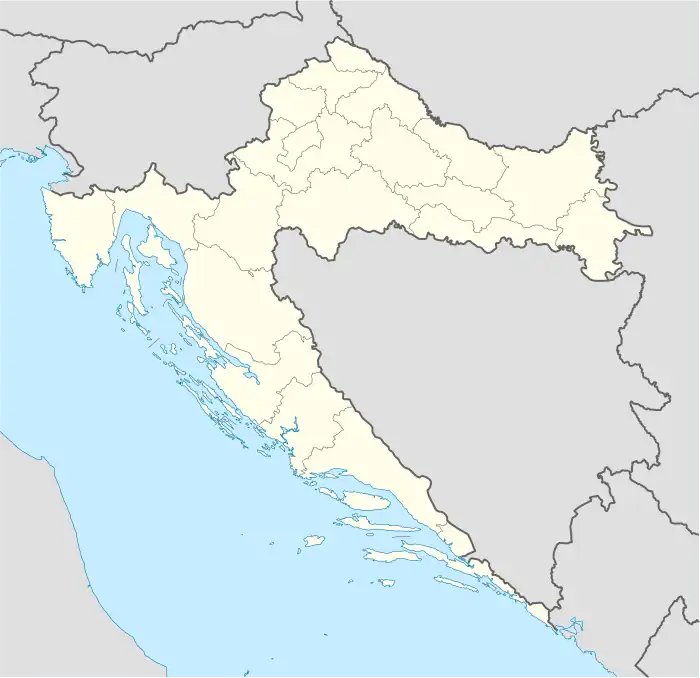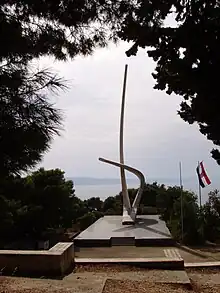Podgora, Split-Dalmatia County
Podgora (pronounced [pôdɡora]) is a small town in the Split-Dalmatia County of Croatia. It is located on the Adriatic coastline of Dalmatia, 65 km south of Split and 135 km north of Dubrovnik. The town has a population of 1,268 (2011) while the municipality of Podgora (which includes several smaller towns) has a population of 2,518 (2011).[3]
Podgora | |
|---|---|
Municipality | |
 Podgora Location of Podgora in Croatia | |
| Coordinates: 43°08′N 17°02′E | |
| Country | |
| County | Split-Dalmatia County |
| Area | |
| • Municipality | 76.2 km2 (29.4 sq mi) |
| • Urban | 28.4 km2 (11.0 sq mi) |
| Population (2021)[2] | |
| • Municipality | 2,233 |
| • Density | 29/km2 (76/sq mi) |
| • Urban | 1,181 |
| • Urban density | 42/km2 (110/sq mi) |
| Website | podgora |
_Podgora_Municipality.PNG.webp)
Podgora has a largely tourism-based economy. With its five hotels, it has four times as many beds as inhabitants.
History
In pashaluk censuses in 1624 and 1690, 80 and 125 houses respectively were recorded. An 1828 status animarum recorded 955 inhabitants living in 194 family households.[4]
Podgora is the birthplace of Don Mihovil Pavlinović, a priest, politician and writer, best known as the first person to speak Croatian in the Dalmatian parliament, seeking the unification of Dalmatia and Croatia.
Organized tourism started in Podgora in 1922, when the first hotel "Praha" was built. During World War II, on September 10, 1942, the Yugoslav Partisans formed the Partisan Navy in Podgora. In 1962 Josip Broz Tito unveiled an impressive monument on a small hill above the port of Podgora, The wings of a seagull, in remembrance of World War II events.
Gallery
 Podgora
Podgora


References
- Register of spatial units of the State Geodetic Administration of the Republic of Croatia. Wikidata Q119585703.
- "Population by Age and Sex, by Settlements, 2021 Census". Census of Population, Households and Dwellings in 2021. Zagreb: Croatian Bureau of Statistics. 2022.
- "Population by Age and Sex, by Settlements, 2011 Census: Podgora". Census of Population, Households and Dwellings 2011. Zagreb: Croatian Bureau of Statistics. December 2012.
- Bezić-Božanić 1992.
Bibliography
- Bezić-Božanić, Nevenka (1992). "Doprinos poznavanju stanovništva Podgore u 19. stoljeću" [Supplement to the study of Podgora inhabitants in the 19th century] (PDF). Čakavska rič (in Croatian). XX (2): 51–61. Retrieved 15 October 2019.
